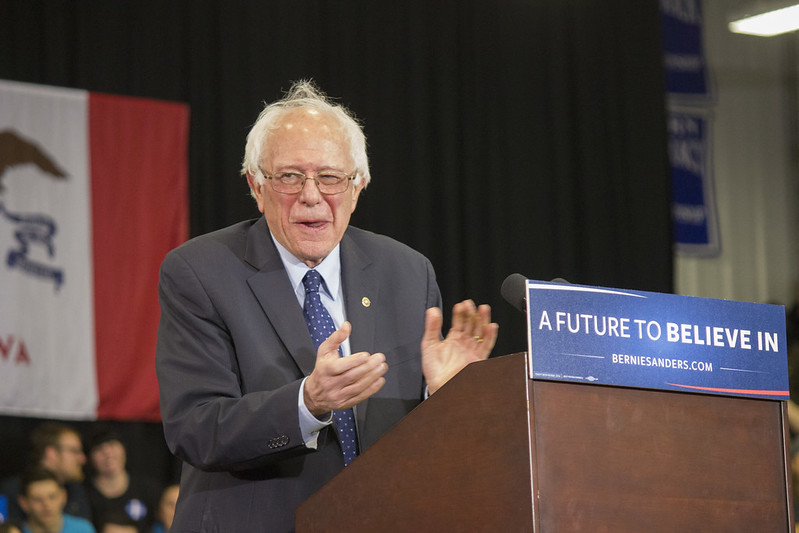Bernie is drawing in Muslim Americans, and University of Arkansas Law Professor, Khaled Beydoun, summed up why in one tweet:
- He was the first candidate to explicitly condemn Islamophobia.
- He visited scores of mosques and met with Muslim leadership.
- He appointed visible Muslim leaders to his campaign team in ’16 and ’20.
Let’s look at each in turn:
- He was the first candidate to explicitly condemn Islamophobia.
Sanders challenges President Donald Trump’s pattern of alienating Muslims and other minority communities, who collectively experience hate-crimes hitting an all time high, according to FBI data. One example of the contrast: In July 2019, Trump magnified attacks against four congresswomen, two of them Muslim, to “go back to their countries” (Ilhan Omar, Rashida Tlaib, Alexandria Ocasio-Cortez, and Ayanna Pressley). Sanders not only condemned Trump’s statement but also helped fundraise for Omar’s re-election. His support goes beyond rhetoric and press releases.
As a Muslim woman of color, I remember encountering Islamophobia and being called a “sand n****r” by a local candidate shortly after Trump’s inauguration. So, it was encouraging to witness Sanders’s support actualizing beyond a press release.
2. He visited scores of mosques and met with Muslim leadership.
Sanders has gone wherever he has been invited to meet Muslim American leadership. More importantly: he listened. Given Sanders’s outreach to people of color who are not Muslim, this is consistent with Sanders’s broader political messaging. The Sanders campaign hired Sami Scheetz, a Syrian-American, as his Constituency Director in Iowa. Serendipitously, Iowa held the first mosque caucus in five mosques because Iowa has the oldest mosque in the U.S.: “The Mother Mosque of America,” as reported by the Middle East Eye. 99 percent of those caucusing supported Sanders.
Abdul El-Sayed received Sanders’s endorsement for his Michigan gubernatorial primary in 2018. Now, El-Sayed serves as a campaign surrogate to highlight Sanders’s progressive message on CNN panels reviewing primary debates. In 2016, Abdelnassir Rashid served the Sanders’ campaign as Deputy State Director for Illinois. Now, Rashid is running for Cook County Commissioner and is encouraged by Sanders’s persistence: “Sanders has built a movement that supports him because he truly cares about ordinary people. His compassion is genuine and goes back decades, and as President I know he’ll fight for working and middle class families and not be influenced by the special interests that have run amok in Washington.”
Unlike Democratic Party insiders, like candidates Joe Biden and Amy Kloubacher, Sanders’s campaign organizes a regular national call for Muslim Americans. Just last month, the Sanders campaign hosted a national organizing call for Muslim-American activists. The call featured two Muslim-American local politicians: Michigan State Representative Abdullah Hammoud and Mayor Sadaf Jafar of New Jersey.
3. He appointed visible Muslim leaders to his campaign team in ’16 and ’20.
Faiz Shakir, Muslim-American, serves as Sanders’s campaign manager. Sanders’ progressive message also drew in other progressive activists, like Linda Sarsour, who helped co-found the Women’s March. Early in the 2016 campaign cycle, Sanders recruited Sarsour as a campaign surrogate. Since then, she has helped organize grassroots initiatives through MPower, the largest Muslim-led organization focused on social and racial justice.
The Sanders message continues to build momentum. Volunteers like Deliah Odeh, one of the 500,000 Muslims living in of Chicago, can still “feel the Bern” because she hears Sanders discussing social justice at home and abroad: from accessing affordable medical care and college education to human rights for all across the globe. Odeh’s positive take on Sanders’ domestic and foreign policies is increasingly common among Muslim Americans.
Mehr Qayyum is an international development and policy consultant based in Chicago.
Photo Credit.
















